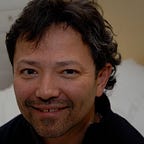Connection 9
Buddhist Philosophy: Emptiness and Becoming
The Radiance of Becoming
The resonance between the Buddhist conceptions of impermanence, dependent origin, emptiness, non-self and suffering and western conceptions of immanence, temporality, difference and a process of becoming should now be coming in to view.
Impermanence is not a lack of realness. Impermanence is first and foremost a rejection of universal abstractions and static, transcendent ideals.
Impermanence is a positive dynamic that encompasses the forces of change. Buddhist philosophy is an attempt to open our eyes to the immanent impermanence and change all around us so that we may be liberated from a transcendent ontology and epistemology that causes us to experience existential lack, and hence suffer.
Buddhist philosophy is radical empiricism, offering a perspective on reality and ourselves based in perception and intuition, and not closed off by transcendent reason. Impermanence is the radiance of becoming that speaks to our ability to participate in the immanent field of change.
A Flow of Forces
Reality is viewed as a stream of phenomenal events that upon closer examination is a process of becoming. Further, the duality of subject and object is a false one that arises by placing our faith in transcendent ideas beyond the immanent field.
There is no duality of subject and object, nor of mind and body. All phenomena are events arising on an immanent plane, driven by a force of change.
Dependent origin is that force of change. Dependent origin explicates impermanence in terms of a process of interrelated arisings.
No thing is independent. No thing has an inherent nature, only an arising nature. It has its genesis in all other things, which in toto are no more than events.
The temporal nature of dependent origin points to a process of becoming driven by a flow of forces that interfuse, interconnect and are interdependent. Things arise and fall, and are no more than a series of images.
They form like multiplicities and dissolve back into becoming. And our interconnection in this field of flux suggests an ethic of compassion for all of reality.
Reality as Creativity
A force of expression drives the formation and dissolution of all things.
The two truths of the Madhyamaka school speak to the appearance of things and a temporal force of impermanence. The two truths speak to the virtuality and actuality of reality.
The middle way is is a reminder to remain cognizant of both aspects of a process of becoming. The open whole is expressed in the dynamism of diversity.
The three natures of the Yogacara school go one step further and remind us that a real philosophy of virtuality and actuality is a construct.
Objective reality in itself remains un-utterable. All is creativity and experimentation.
Emptiness as the Fullness of Becoming
Emptiness is the emptiness of being. It is the fullness of becoming, the radiance of becoming.
The emptiness of transcendence is the fullness of immanence. The emptiness of identity is the fullness of a process of pure difference.
Emptiness is not nihilism. Something exists in emptiness, it is real in becoming but unreal in being, essence, or identity. The concept of emptiness acts as a correction of cognitive distortion. It forces us to consider thought without a dogmatic image as the liberated mind.
Emptiness has been understood when we are able to experience reality from multiple perspectives.
Emptiness is not Transcendent
Emptiness is not a transcendent universal, but simply the clarity of immanent becoming. Emptiness exists insofar as it points us away from transcendent identity and towards immanent difference-in-itself.
The function of emptiness is to encourage us to stop grasping at being and embracing becoming. But emptiness as a objective concept is itself empty, and behind it there is nothing; behind impermanence there is nothing.
Emptiness is a constructive concept only, a perspective and not the objective truth of the universe.
I hope you enjoyed this article. Thanks for reading!
Tomas
Please join my email list here or email me at tomas@tomasbyrne.com.
Excerpt from my forthcoming book, Becoming: A Life of Pure Difference (Gilles Deleuze and the Philosophy of the New) Copyright © 2023 by Tomas Byrne. Learn more here.
